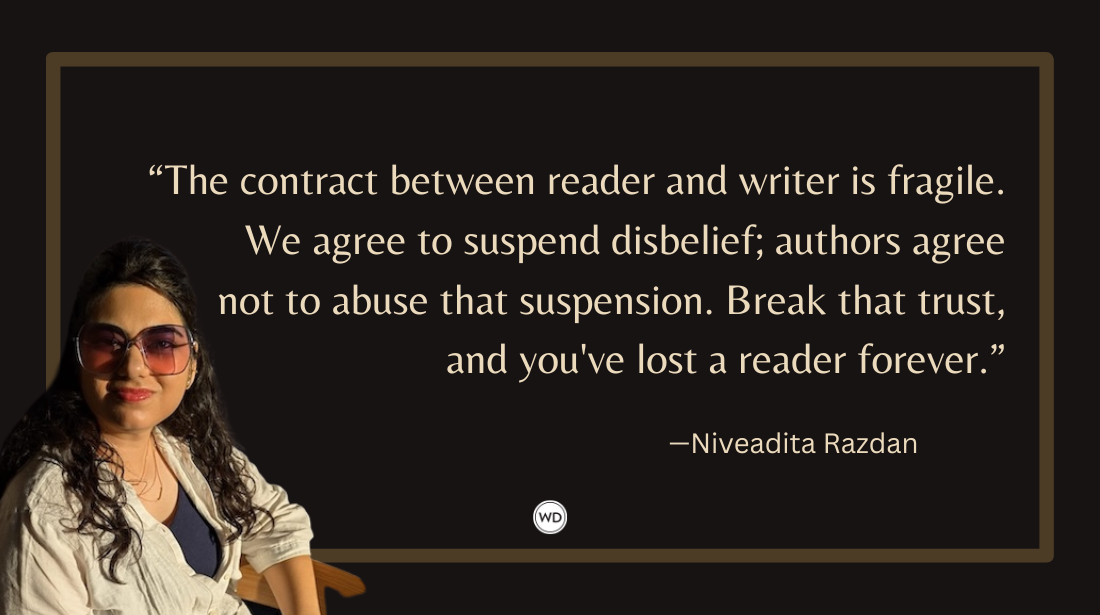Immutable Moments: The Load-Bearing Beats of a Story
Dr. Finnian Burnett shares how focusing on immutable moments instead of plot can help writers establish the load-bearing beats of a story.
Every time I run a class on plotting, I inevitably get the same comments from writers:
If I outline, my story will be the same as everyone else’s.
I don’t want to know everything!
Planning takes away all my creative freedom.
I get it. Plotting can feel like putting a straitjacket on your creativity, forcing it into a constrictive shape, leaving you no wiggle room for all those brilliant ideas that pop into your head in the middle of the night.
But plotting is inevitable. When you finish your book and start writing your query letter, my friend, it’s made of the first few beats of your novel. That synopsis agents and publishers want? It’s also made of all the beats of your novel.
Creative freedom is lovely, and I fully support that. The thing is, there are some moments in your book that are non-negotiable. If they don’t happen, the entire story collapses like that soufflé you made to procrastinate writing your novel.
So, you need beats, but you still want freedom. That’s why I started a plotting method I call “Immutable Moments.” It’s a big word for the simple idea that there are certain beats of your novel which are load bearing. Unchanging and unchangeable. It’s like building a house. If you knock out a load-bearing wall, your whole house is coming down. If you knock down (or rearrange) your decorative walls, you haven’t done anything but create a fabulous new kitchen and made room for that SMEG fridge, which you definitely didn’t buy just because they use them on the Great British Bake Off.
The basic idea is that Immutable Moments are the events your story can’t function without.
- If you remove them, the story falls apart.
- They directly push the protagonist forward in their core goal.
- They connect the overall arc of the plot from start to finish.
An example:
In The Princess Bride, Westley “dying” has to happen, otherwise Buttercup doesn’t agree to marry Humperdinck. It’s an Immutable Moment.
But other things, the Rodents of Unusual Size (R.O.U.S) or the encounter with Miracle Max are wild card moments. They can be shuffled, even omitted. But the world won’t collapse.
In The Hitchhiker’s Guide to the Galaxy, the Earth has to be destroyed, otherwise, Arthur never goes on his journey.
But things like the bowl of petunias and the sperm whale are wildcard moments. They’re fun and they add to the richness of the world, but they don’t collapse the core arc of the story if you remove them or shift them around.
So how do you figure out your Immutable Moments before you accidentally write an 80,000-word novel without a plot and have to go back and figure out how to restructure it to make sure it doesn’t crumble to dust around you?
You should know the basic arc of your book. This means that before you start writing your story, you should know three things:
- Who is the main character?
- What is their primary goal?
- What do they have to learn/do/experience to get there?
Once you know these things, you can start fleshing out the rest of your beats. Start with your inciting incident. This is the event that starts everything in your novel—the moment where the protagonist moves into the quest, the pursuit of the love interest, the fight against the monster tidal wave threatening to destroy the world, the step into the new way of living.
Once you know your inciting incident, you can work forward with the cause and effect of the rest of the structure and ultimately, sum up the entirety of your plot arc in one long sentence.
Main character experiences inciting incident which causes them to move into new world where they face rising action and conflict in pursuit of main goal until they finally resolution.
In The Princess Bride, this might look like:
Buttercup believes Westley has died (inciting incident), which leads her into a forced engagement with Prince Humperdinck and is moved to the castle (new world), where she faces kidnapping and deception (rising action and conflict) in pursuit of her own freedom and true love (main goal), until she is finally reunited with Westley (resolution).
In the Hitchhiker’s Guide, this might look like:
Arthur Dent experiences the destruction of Earth (inciting incident), which propels him into a bizarre and terrifying universe (new world) where he faces evil aliens, improbable technology, and existential confusion (rising action and conflict) in pursuit of understanding his place in the universe and simply surviving (main goal), until he ultimately accepts the absurdity of the cosmos and settles into his strange new life (resolution).
Try writing this yourself, for your story. Write your plot arc in one sentence.
Now you’ve done it. If you can write a sentence like the ones above, you have the Immutable Moments of your story.
You have the inciting incident. The new world. The rising action and conflict. The main goal. The resolution. Those moments hold the entire arc of your plot together. Simple, right? But there’s still so much to explore!
From here, you can go deeper into emotional arcs by asking yourself questions about each beat:
- Does this moment force my protagonist to change something about their beliefs?
- How does this moment affect my character emotionally?
- If I cut this moment, what would it change about my character’s emotional arc?
Using the beats of your story to build an emotional arc can lead to a more satisfying payoff for the reader. Knowing the beats of your story, even just the Immutable ones, means you have a roadmap, not only for the plot, but also for the character’s inner journey.
Developing your Immutable Moments also means you can filter in those wild card moments. Remember the decorative walls we talked about earlier? These are scenes that add to the richness of your novel without bearing the weight of the entire structure. Wild card moments are those added details you think about when brainstorming. Silly moments. Heartfelt ones. Hilarious comments from another character.
In The Princess Bride, some of the best parts of the book are wildcard moments such as the “mawwaige” scene, the over-the-top sword fight, and the bisexual subtext between Inigo and Westley.
In the Hitchhiker’s Guide, wildcard moments make up the heart and soul of the series. Consider the improbability drive’s side effects, the ghost of Zaphod’s grandfather, the guide entries sprinkled throughout the book, and Marvin the Android’s endless pessimism. Would the book be the same without them? No. Would the entire arc still stand without it? Absolutely yes.
The best part about wildcard moments is you can plan them ahead of time or you can lean into them while you’re writing. They give writers who crave creative freedom the ability to go off on tangents, all the while keeping the Immutable Moments in mind to keep them on track, to keep the structure solid. If you know the Immutable Moments of your novel, you can start writing today without worrying about utter collapse and ruin because one of your load-bearing walls was built on a slant.
Try it today. You may still end up in a writerly crisis at some point, weeping over plotting beats and asking yourself why anyone ever writes anything. Ever.
But at least you’ll have Immutable Moments. Unchangeable. Unchanging. And waiting for you to stop crying and start writing.








